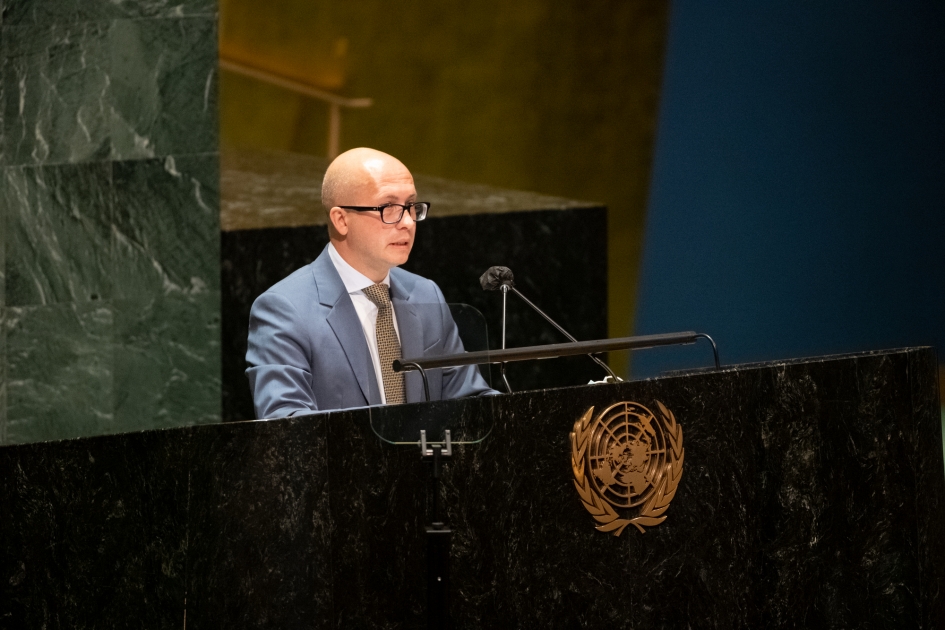Statement by representative of the Russian Federation Evgeny Varganov at the plenary meeting of the General Assembly on Secretary-General's report "Our Common Agenda"
We appreciate this opportunity to have another, more detailed discussion of the report by the Secretary-General of the United Nations “Our Common Agenda” that elaborates on United Nations’ further tracks of operation and issues pertaining to international cooperation.
There is much in the report that deserves closest attention. We agree with its basic ides about the need to strengthen the multilateral aspects of international relations that should lay the foundation for a more equitable multipolar world order.
Unfortunately, at this point we see the opposite trend. The disunity of the international community is but growing, which largely impedes efforts to overcome traditional and new challenges in the areas of healthcare, digital domain, climate, social stratification. In this regard, we support the Secretary-General’s call to solidarity and collective action. We also agree that interests of developing states need to be prioritized.
We would be ready to cooperate in enhancing the role of ECOSOC, boosting its cooperation with G20, promoting science-based approaches to the work of the Organization, inclusive reform of the global taxation system, and global economic governance in general, regulating AI-related issues, restricting the influence of technological giants, increasing efficiency of management of the Internet.
At the same time, we believe that some conclusions of the report are ambiguous and detached from the framework that is envisaged by the main UN documents and agreed parameters.
In the context of peace and security agenda, we believe focus on human rights and gender-related issues is inappropriate. The idea of an inextricable connection between climate and security also appears counter-productive. We are convinced that the “division of labor” is a strong side of the UN system, where all main bodies work within their specific mandates without infringing on each other’s responsibilities. Against this backdrop, it is obvious that intermingling of mandates may only lead to duplication of efforts and a decrease in the overall efficiency of the Organization. We are convinced that cases of poor coordination among those who execute interfacing mandates result from either irresponsible engagement or human mistake, to which no one is immune. This, however, gives no reason to be constantly revisiting mandates and reforms.
We disagree with intrusive demands in the area of mitigating climate change that do not account for gaps in the level of states’ socio-economic development and infringe on their sovereignty. We do not deem it feasible to induce states to go beyond their obligations under the Paris Agreement, use negative economic incentives regarding national high-carbon industries, and uphold green protectionism in trade. Attempts to achieve climate goals in one move may create grave energy misbalances (which we have seen over the recent weeks) and even trigger social calamities.
As for disarmament, we are concerned over the lack of calls to uphold the existing and elaborate new agreements by consensus, as well as accentuation of the Treaty on the Prohibition of Nuclear Weapons that does not enjoy universal support. We hear the call of the Secretary-General to update approaches to disarmament in order to ensure safety of a person, state, and collective security. However erosion of the present-day system of arms control, disarmament and non-proliferation has concrete reasons. First of all, it is caused by purposeful acts of some states, shattering it in order to have more discretion, i.a. in terms of forceful pressure.
Multilateral cooperation must rest upon decisions of the Charter bodies of the United Nations in the first place. As was the case with a number of initiatives, recommendations of some “Secretary-General’s advisory boards” comprised of experts and “former” politicians can turn out having a duplicating or even divisive character. Thus, we have questions to the proposal to create some “emergency response platform” to discuss urgent global problems that should bring together states and non-governmental mechanisms. Such an initiative contradicts the exclusive prerogatives of the General Assembly and the Security Council of the United Nations, that can i.a. hold emergency sessions. Besides, even sovereign governments turned out unable to demonstrate the needed level of solidarity in the face of a common threat – coronavirus pandemic. How then should we ensure consolidated efforts of a more complex system, such as a proposed “network” platform?
We have same questions to the new consultative mechanism of the “Elders” preparing the so-called Summit of the Future on the basis of the “Global Commons” concept that has not been endorsed at the inter-governmental level. At this stage, we are not ready to commit to making it a UN document – unless it is discussed at the national levels and endorsed by Member States.
At the healthcare track – we have noted focus on the recommendations of the Independent Panel for Pandemic Preparedness and Response by the WHO Director-General, though this is not the only source of such work at the WHO.
Also, we cannot support the stance towards levelling out Member States and non-state entities (including NGOs, private companies, municipalities) within the United Nations – the so-called multi-stakeholder approach. This is fraught with undermining the inter-governmental nature of our global Organization that is stipulated in its Charter, and bringing the entire modern architecture of international relations to a collapse. We are convinced that such novelties will only decrease efficiency and performance of the United Nations. By all means, opinions of stakeholders and experts make a meaningful contribution to the discussion. We can only welcome this exchange to proceed i.a. through a national-level dialogue. At the same time, we must be mindful that it is states that are considered entities of the international law, meaning that states make decisions and bear responsibility for implementing them. We count on our colleagues from the Secretariat to account for our approaches when promoting the proposals contained in the SG report.
Thank you.
